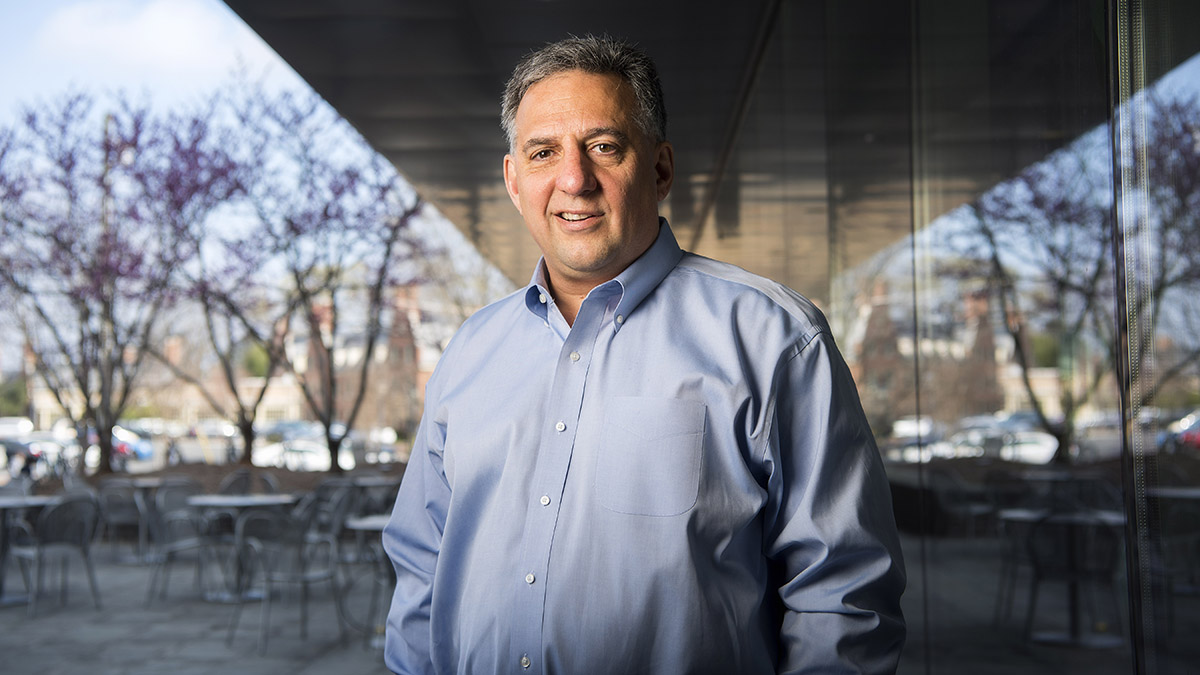Massey winner Gregory Gangi has a passion for the natural world
Gregory Gangi argues that greater collaboration between universities, government and business can transform North Carolina into a clean technology powerhouse.

Gregory Gangi grew up in a New Jersey neighborhood that was part of the urban sprawl spilling out of New York City.
“All the trees had been bulldozed to clear the way for development,” said Gangi, a 2018 C. Knox Massey Distinguished Service Award winner. “In my neighborhood, every house on my street had a sycamore tree in the front yard except for one where there were two tall oaks that had somehow escaped the carnage.”
Gangi now serves as associate director for education and teaching professor at the UNC Institute for the Environment. He also holds a secondary appointment as an associate teaching professor with the curriculum in the environment and ecology, which was elevated to the Program in Environment, Ecology and Energy (E3P) on July 1.
But he was 13 when his passion for the natural world began to stir.
It happened somewhere along the way of that long car ride he took with his family when they moved from Jersey to Chapel Hill. He still remembers staring in wonder at the towering pines by the interstate, and once in Chapel Hill, at the century-old oaks that stood sentry along Franklin Street.
Lessons abroad
As he grew older, he came to understand the natural world was majestic, yet fragile, and that it needed protecting from unnatural forces that could do it harm. That notion was reinforced again and again during the three years he spent in Germany in the mid-1980s as an undergraduate and graduate student at the University of Bamberg.
First came the April 1986 disaster at the Chernobyl nuclear power plant in Ukraine, followed that same year by the chemical spill in Switzerland that dumped tons of pollutants into the Rhine River, turned it red and killed a large proportion of the European eel population. During this same period, Germans discovered their trees were dying, a phenomenon they called waldsterben or “forest dying,” Gangi said. The culprit: a cocktail of industrial pollutants known as acid rain.
Home to Chapel Hill
Those events broadened his interest in conservation to environmental policy around the world.
After completing his master’s degree in government and international studies from the University of South Carolina in 1991, he returned to Chapel Hill to begin his doctorate, which he completed in 1999.
Gangi said he began his doctorate to gain the credential he would need to work in international economic development with a focus on sustainability. It was while teaching as a graduate student that Gangi developed “a deep appreciation of the impact [he] could have teaching and mentoring students.”
It is that bond with students that led Gangi to join the faculty at Carolina in 2000 and never leave.
As a tropical ecologist, Gangi developed a focus on experiential education for his students, taking them on summer programs to Siberia, the Galapagos and the Sierra Nevada. He teaches a course on coral reef ecology, and every spring he takes students for a 10-day trip to the Virgin Islands National Park. Since 2002, he has taken students to St. John every year except last year because of hurricane damage to the campground where they would have stayed.
As an academic adviser in environmental sciences, Gangi encouraged his students to think beyond mere box-checking to meet minimum graduation requirements. “I want students to take a long-term view and take courses that would challenge them and prepare them to seize unexpected opportunities later in their careers. The job market of the future is going to demand people who are capable of reinventing themselves throughout their career.”
Serving the state
His skills at teaching and mentoring have earned him numerous awards over the years, including the Order of the Golden Fleece (2008); two Student Undergraduate Teaching Awards; the Tanner Teaching Award (2010); and national honors by the National Academic Advising Association in 2007 and 2015. But as one nominator wrote, the Massey award recognized Gangi for his contributions as a catalyst for shaping interdisciplinary curriculum and learning opportunities beyond the classroom to better prepare students for emerging career paths.
One shining example of that is the UNC Clean Tech Summit, an annual event on campus that Gangi spearheaded in 2014 to bring together industry professionals, policymakers, academics and students to help advance the clean technology industry within the state.
Gangi said the idea for the summit sprang from the Burch program that he started in 2013 to allow 20 to 24 students from Carolina to travel to Germany for six weeks to study environmental policy.
Gangi also helped develop five-year joint bachelor’s and master’s programs that include the School of Government, the Gillings School of Global Public Health, the School of Media and Journalism and the School of Information and Library Science.
One reason the Massey means so much to him, Gangi said, is because it validates the full sweep of his work.
Gangi said he is convinced North Carolina’s economy will grow stronger – along with the environment – by the continued rise of the clean technology industry that has already created more than 10,000 jobs in the state over the past decade.
He brings that conviction to the Future of Energy course he now occasionally teaches as a Maymester class, which includes field trips across a vast swath of the eastern half of North Carolina to look at innovations in solar, wind and ocean energy, bio-energy and energy efficiency.
“The future of North Carolina’s economy will largely depend on the ability of the private sector, academia and government to work together to advance innovation,” Gangi said.




